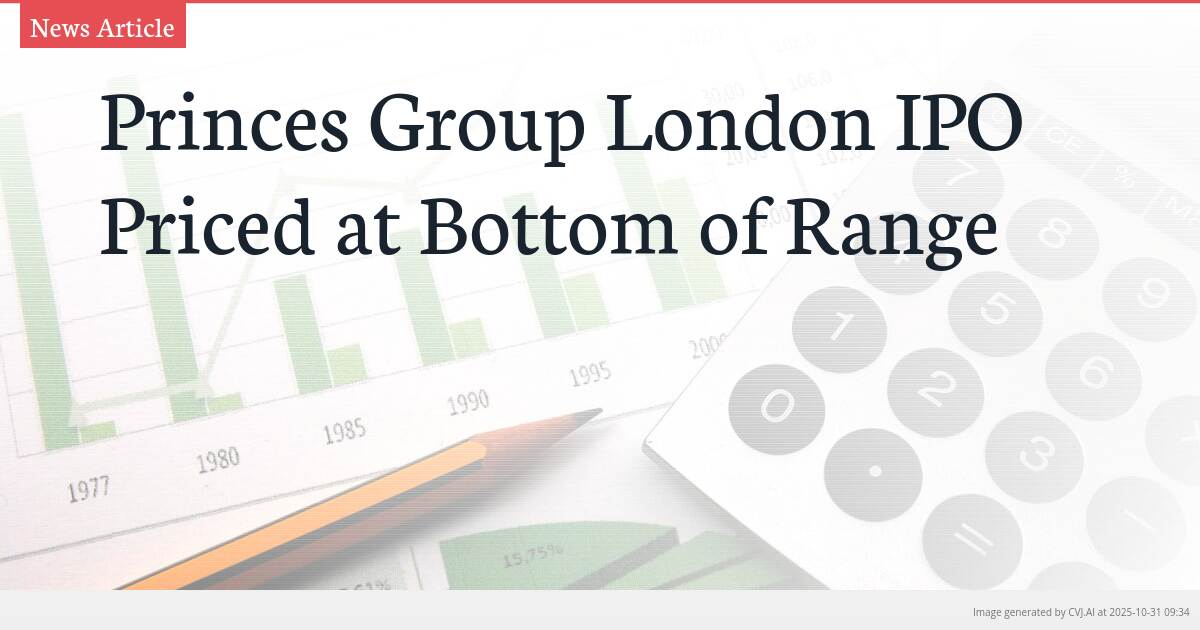This summary text is fully AI-generated and may therefore contain errors or be incomplete.
Introduction
Princes Group Plc has priced its London initial public offering at the bottom of its marketed range, raising £400 million in what will be the UK’s largest local company listing in four years. The canned food supplier’s offering comes during one of the worst periods for London IPOs in decades, with the pricing reflecting the challenging environment for new listings on the City’s exchange and broader concerns about the London Stock Exchange’s appeal to companies seeking public capital.
Key Points
- Priced at £4.75 per share, raising £400 million for acquisition funding
- Largest UK local company IPO in four years despite challenging market conditions
- Achieves market capitalization of £1.16 billion for the canned food supplier
A Cautious Entry to Public Markets
Princes Group Plc, the food supplier best known for its canned tuna brand, has taken the cautious route to its London Stock Exchange debut by pricing its IPO at £4.75 per share—the absolute bottom of its marketed range. This pricing strategy, while securing £400 million ($525 million) in fresh capital, signals the company’s willingness to accept a discounted valuation to ensure the offering’s success in a hostile market environment. The decision to price at the range’s floor reflects both management’s pragmatism and the current investor sentiment toward new listings on the London exchange.
Despite the discounted entry, the IPO represents a significant milestone for the United Kingdom’s capital markets. At £400 million, this marks the largest first-time share sale for a local British company in four years, giving Princes Group a market capitalization of approximately £1.16 billion. The proceeds are earmarked for funding future acquisitions, positioning the canned food supplier for strategic expansion even as it navigates the challenging public market debut. The company’s transition from private to public ownership comes at a time when many UK-based companies are opting to list elsewhere or remain private.
London's IPO Market in Crisis
The Princes Group offering unfolds against what Bloomberg describes as a ‘dismal’ year for London’s initial public offerings market, with fundraising hitting 30-year lows. This prolonged downturn represents one of the most challenging periods in the London Stock Exchange’s modern history, characterized by both reduced deal volume and notable companies choosing alternative listing venues. The trend has raised fundamental questions about the City’s enduring appeal as a global financial hub for public offerings.
The broader context reveals a pattern of erosion in London’s IPO dominance. As companies increasingly look to other exchanges for their public market debuts, the United Kingdom’s flagship exchange faces mounting pressure to address structural issues affecting its competitiveness. The Princes Group IPO, while significant in scale relative to recent UK listings, serves as a barometer for the health of British public markets—demonstrating that even substantial offerings must navigate investor caution and pricing pressure.
Strategic Implications and Market Positioning
For Princes Group, the IPO represents a strategic pivot toward accelerated growth through acquisitions, funded by the £400 million raised in British pounds. The company’s decision to proceed with its public offering despite unfavorable market conditions suggests confidence in its underlying business model and growth prospects. As a established player in the canned food sector, Princes Group brings recognizable consumer brands to the public markets, though even this established market presence couldn’t command premium pricing in the current environment.
The successful completion of this public offering, albeit at the bottom of the range, provides a crucial test case for other UK companies considering London listings. It demonstrates that investor appetite exists for quality British businesses, but that valuations must reflect market realities. The £1.16 billion market capitalization achieved, while potentially lower than what might have been possible in a healthier IPO climate, establishes a foundation for future growth and potentially paves the way for other UK companies to consider public listings despite the challenging fundraising landscape.
📎 Read the original article on bloomberg.com

